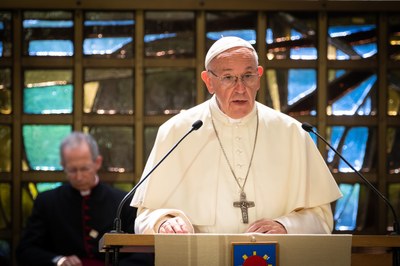Pope Francis affirms Catholic Church’s commitment to the ecumenical journey
 The thirst for material things blinds human beings to their companions and that indifference abounds in the world’s streets today, Pope Francis said in a homily at the World Council of Churches (WCC) in Geneva today.
The thirst for material things blinds human beings to their companions and that indifference abounds in the world’s streets today, Pope Francis said in a homily at the World Council of Churches (WCC) in Geneva today.
At the Ecumenical Centre, Pope Francis spoke about walking towards Christian unity and the pitfalls that we encounter on the journey.
“For us as Christians, walking together is not a ploy to strengthen our own positions, but an act of obedience to the Lord and love for our world. Let us ask the Father to help us walk together all the more resolutely in the ways of the Spirit,” said the Pope.
“I wanted to take part personally in the celebrations marking this anniversary of the World Council, not least to reaffirm the commitment of the Catholic Church to the cause of ecumenism and to encourage cooperation with the member churches and with our ecumenical partners.
“Whenever we say ‘Our Father’, we feel an echo within us of our being sons and daughters, but also of our being brothers and sisters. Prayer is the oxygen of ecumenism,” said Francis.
The landmark visit of Pope Francis to the World Council of Churches on 21 June is the cornerstone of the ecumenical commemoration of the WCC's 70th anniversary.
On his arrival from Rome for his one-day visit, the pontiff held a brief private meeting with the President of the Swiss Confederation, Alain Berset, at Geneva’s international airport.
Pope Francis’ day at the WCC began with an ecumenical prayer service in the chapel of the Ecumenical Centre from where he delivered his homily on “walking the ecumenical journey.”
Founded in 1948
Founded in 1948, the WCC brings together 550 million Christians from Orthodox, Anglican, Methodist, Baptist, Lutheran and Reformed churches.
Although the Roman Catholic Church is not a WCC member it is a member of the WCC’s Faith and Order Commission and the two cooperate on many matters.
“The World Council of Churches was born in service to the ecumenical movement, which itself originated in a powerful summons to mission: for how can Christians proclaim the Gospel if they are divided among themselves?” said the Pope.
“The missionary mandate, which is more than diakonia and the promotion of human development, cannot be neglected nor emptied of its content. It determines our very identity.”
Present during the homily were WCC general secretary, Rev. Dr Olav Fykse Tveit, Dr Agnes Abuom, the moderator of the WCC’s central committee, and committee vice-moderators Bishop Mary Ann Swenson and Metropolitan Gennadios. They were joined by members of the central committee, one of WCC’s main governing bodies.
Official contacts between the Roman Catholic Church and the WCC date from the early 1960s, following the decision by Pope John XXIII in 1959 to convene the Second Vatican Council.
In his homily delivered in the WCC Chapel, Pope Francis said human beings are constantly on the move, while noting that walking is a discipline needing “patience and exercise, day after day.”
He cited the Apostle Paul’s epistle to the Galatians (5:16) saying, “We can either walk in the Spirit along the path opened up by our baptism or else we can ‘gratify the desires of the flesh’.”
Francis said, “Driven by our instincts, we become slaves to unbridled consumerism, and God’s voice is gradually silenced.
“Other people, especially those who cannot walk on their own, like children and the elderly, then become nuisances to be cast aside. Creation then comes to have no other purpose than to supply our needs,” he said, speaking the day after World Refugee Day.
Francis noted that in the course of history, divisions between Christians had often arisen because “at their root, in the life of communities, a worldly mindset has seeped in.”
“Ecumenism made us set out in accordance with Christ’s will and it will be able to progress if, following the lead of the Spirit, it constantly refuses to withdraw into itself,” he said.
Source: WCC

